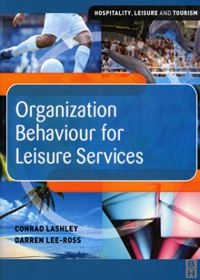- 定價227.00元
-
8
折優惠:HK$181.6

|
|
|
|
Organization Behaviour for Leisure Services
|

|

沒有庫存
訂購需時10-14天
|
|
|
|

|
|
9780750657822 | |
|

|
|
Conrad Lashley , Darren Lee-Ross | |
|

|
|
桂魯 | |
|

|
|
2003年1月01日
| |
|

|
|
597.00 元
| |
|

|
|
HK$ 537.3
|
|
|
|
|

| |
|
|
|
|
| |
|
|
詳
細
資
料
|
* 叢書系列:休閒
* 規格:平裝 / 普級 / 單色印刷 / 初版
* 出版地:台灣
休閒
|
|
分
類
|
專業/教科書/政府出版品 > 生物資源類 > |
同
類
書
推
薦
|
|
|
內
容
簡
介
|
With a user-friendly structure and style, the text is an ideal introduction to the fundamental issues involved - perfect for students and managers alike.
1.Provides conceptual basis for the study of organizational behaviour in the hospitality, leisure and tourism industry.
2.Includes special focus on the leisure industry, with material on ’emotional labour’, ’empowerment’ and ’managing diversity’.
3.Contains a wide range of international case examples.
Organization Behaviour for Leisure Services discusses and questions a number of key elements, including:
5.The individual and the organization
6.Groups in the organization
7.Organizational structures and behaviour
8.Management within the organization
9.Commercial hospitality, leisure and tourism in a service context
Taking the view that leisure services involve an array of industry sectors - they are related, for instance, to work-time spent eating, drinking and staying away from home, as well as the more obvious recreational pursuits - the text uses examples and case studies from a wide range of international businesses such as hotels, restaurants, museums, shopping malls and sports stadia. Specific examples used are from Marriott’s, McDonald’s, Trafford Centre and many more.
With a user-friendly structure and style, the text is an ideal introduction to the fundamental issues involved - perfect for students and managers alike.
|
|
目
錄
|
Introduction: hospitality, leisure and tourism definitions and debates;
Hospitality, leisure and tourism management and organizational behaviour;
The context of the leisure services organizations;
Organizational structure design;
Metaphors for understanding leisure services;
Emotions in hospitality, leisure and tourism organizations;
The individual in the service organization;
Groups, leadership and power;
Culture and the leisure services community;
The empowered hospitality, leisure and tourism organization;
Effective communication in hospitality, leisure and tourism organizations;
Managing diversity in the organization;
Management as an integrating activity;
Trends and futures in hospitality, leisure and tourism organizations.
|
|
|
書
評
|
|
|
|
|

